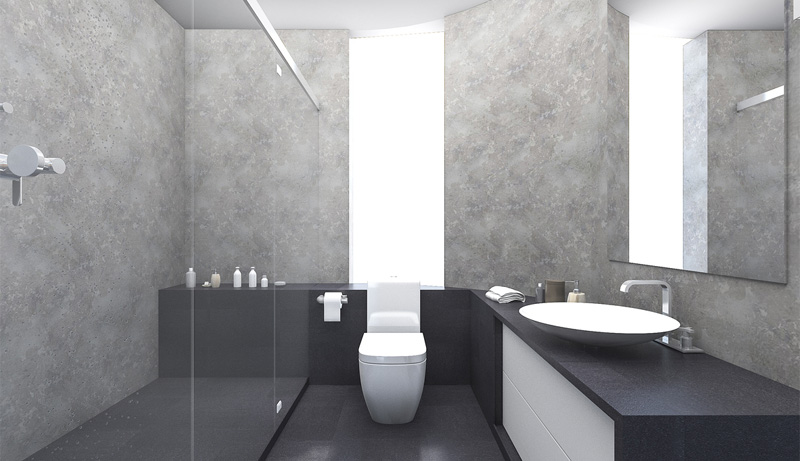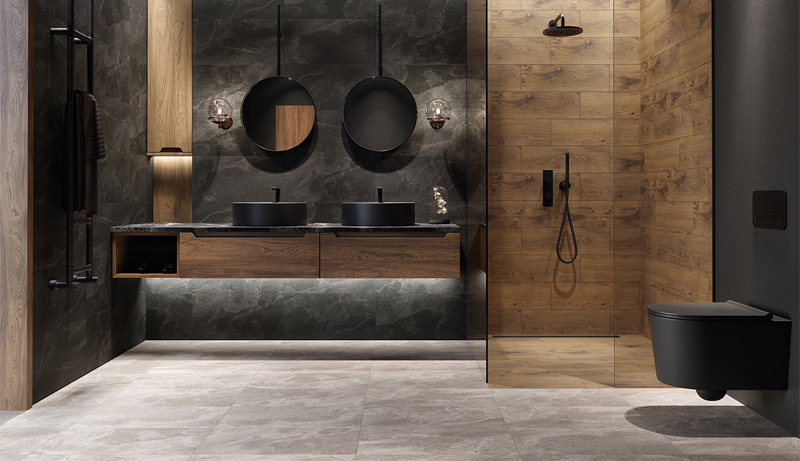When it’s time to give your bathroom a fresh look, one of the first decisions you’ll face is whether to opt for bathroom wall panels or traditional tiles. Fortunately, we’re here to put an end to the ongoing debate.
Shower Wall Panels vs. Tiles: Key Considerations
Before diving into the shower wall panels vs. tiles debate, let’s address some essential considerations. When it comes to selecting between these options, it’s crucial to have a clear grasp of key features to ensure a hassle-free bathroom transformation.
Here are the key features to watch out for when making your choice:
- Waterproof: Bathrooms demand walls that are waterproof, especially in areas prone to water splashes. A failure in waterproofing can lead to mold and other issues.
- Installation: Your choice should be easy to install. This not only saves costs but allows for straightforward DIY repairs when necessary.
- Maintenance: Look for low-maintenance options that simplify your bathroom care routine.
- Style: Select a style and pattern that harmonizes with your bathroom’s theme and aesthetics.
Exploring Bathroom Shower Wall Panels
Shower wall panels, also known as wet wall panels, bathroom panels, waterproof wall panels, or shower boards, are typically crafted from PVC plastic, ensuring 100% waterproofing. This feature makes them a prime choice for bathroom walls. They come in various materials, including acrylic and fiberglass, offering different finishes to suit your preferences.
Advantages of Shower Wall Panels Over Tiles
In recent years, shower wall panels have gained popularity for several compelling reasons:
- Easy Installation: Shower wall panels are notably easy and quick to install. Unlike the time-consuming process of placing individual tiles, you can install whole panels in a matter of hours, depending on your bathroom’s size.
- No Grout: Unlike traditional tiles that require grouting, wall panels fit seamlessly, eliminating the need for grout. This seamless design makes them 100% waterproof, as water cannot seep in and simply slides off.
- Low Maintenance: Tiled bathrooms often entail labor-intensive cleaning, with grout being a prime area of concern. Shower wall panels, with their grout-free design, are far easier to clean and maintain. A cloth and some water are all you need to keep them in pristine condition.
- Cost-Effective: While the initial purchase of wall panels may be slightly pricier, they prove cost-effective over their lifespan. With fewer chances of chips or cracks, repair costs are minimal. Additionally, the easy maintenance and durability of the PVC material further contribute to long-term savings.
The Appeal of Tiled Bathroom Walls
While bathroom panels offer distinct advantages, tiles continue to hold their own charm and unique benefits. Let’s explore a few reasons why many still prefer tiles:
- One-Man Job: Installing tiles in your bathroom can often be a one-person job. Unlike shower wall panels, which can be heavy and may require an extra pair of hands. If you’re inclined to tackle the project solo, tiles are a more manageable option.
- Versatile on Curved Surfaces: Tiles are highly adaptable, making them suitable for both straight and curved surfaces. It can be challenging to find curved wall panels or ensure they conform perfectly to a curved wall. In contrast, tiles can be easily cut and arranged to fit any shape or size.
- Environmental Friendliness: Tiles predominantly employ natural materials, such as ceramics, which are inherently more environmentally friendly than the plastic used in wall panels.
- Enhanced Customization: While wall panels offer a degree of customization, tiles currently provide a wider array of options for personalization and styling.

Bathroom Wall Panels vs. Tiles FAQ
Here are answers to some common questions:
Are shower wall panels cheaper than tiles?
It depends on various factors. While shower wall panels may have a higher initial cost, considering their installation, maintenance, and lifespan, they can be more cost-effective than tiles.
Can you install shower panels over tiles?
Yes, you can install shower wall panels directly over existing surfaces, including old tiles.
What is the best type of tile to use in a shower?
For those on a budget, simple ceramic tiles are a good choice for bathroom walls, with porcelain tiles being more suitable for areas directly exposed to splashes. Glass and stone tiles also offer attractive options, but it’s essential to use the appropriate grout for your chosen tile type.
In Conclusion
Both tiles and shower wall panels present their respective advantages and drawbacks. Your ultimate choice will be a reflection of your personal preferences and the ambiance you wish to create in your bathroom.
For our part, we find shower wall panels to be a compelling option. They offer cost-effectiveness and the potential to transform your bathroom into a modern and stylish space. However, the decision ultimately lies in your hands, as you curate a bathroom environment that suits your taste and lifestyle.
